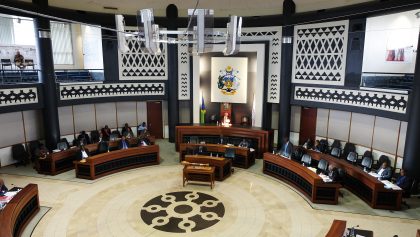National Council of Women pushes for women in politics
One out of 50 members in the current National Parliament of Solomon Islands is a woman. Three women have been elected to Parliament in the 39 years since the country’s independence.
According to Casper Fa’asala, Gender and Women in Leadership Desk officer for the Solomon Islands National Council of Women, male-dominance in the political system goes against traditional societal norms.
“If we look at our social structures in the country, we have patrilineal and matrilineal systems, and therefore God-given structures are already there to show that women also have a place in leadership in tradition,” he said.
Mr Fa’asala said because of that tradition, women should be involved in decision-making in provincial assemblies and Parliament.
To support women who want to stand in the upcoming provincial and national general elections, the Solomon Islands National Council of Women will host a training programme for women from across the country next month.
The five-day, Strongem Mere fo Patisipate Long Politiks and Lidasip lo Solomon Aelans programme aims to help aspiring women leaders navigate the political system.
Participants will review the functions of the Political Parties Integrity Commission and political party platforms, among other topics.
Political party leaders will be invited to present their party platforms during the training, and the women are encouraged to use that information to choose a political party before their entry into politics.
The training will also help participants create action plans to prepare for the upcoming elections.
Provincial women’s councils and other networks will identify participants for the programme that will be held in Honiara from 16 to 20 October.
The Office of the Registrar for the Political Parties Integrity Commission will help facilitate the programme, and the in-country office of the United Nations Development Programme will provide funding.
Mr Fa’asala said to recognise real democracy in the country, women have to be included in the political system.
“It is quite true that we are still young in terms of politics for Solomon Islands, but we must push the political envelope for women,” he said.
But he said there are still barriers to voters selecting female candidates.
According to a 2015 article on aiding women candidates in the Solomon Islands published in the journal Asia & the Pacific Policy Studies, 14 percent of the nearly 3,000 male candidates who stood in general elections between 1980 and 2010 were successful. Of the 96 female candidates who stood in elections during the same period, 2 percent were successful.
Mr Fa’asala said women contributed to men winning in past elections, but he hopes they will stand together in the next election cycle and support women candidates.
“If they can make a choice to make women win, surely they have the number in terms of the population of Solomon Islands,” he said, “They can choose to have a number of good women to win this round.”
By Merinda Valley


